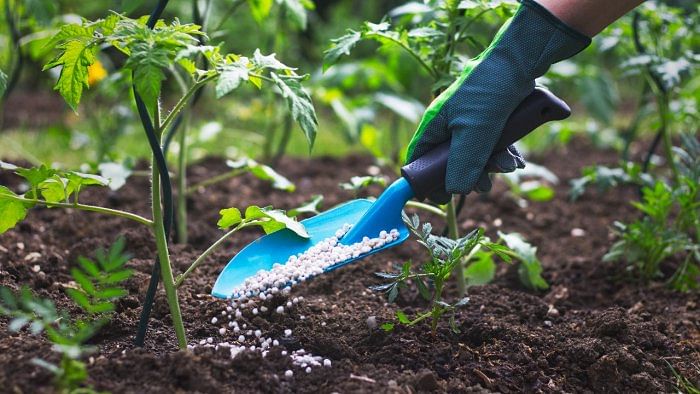
Russia for the first time became the biggest fertiliser supplier to India in the first half of the 2022/23 fiscal year by offering discounts over prevailing global prices, cornering more than a fifth of the market share, government and industry sources said.
India's fertiliser imports from Russia surged 371 per cent to a record 2.15 million tonnes in the first six months of the year started on April 1, a senior government official who was closely monitoring the imports, told Reuters.
He declined to be named due to the sensitivity of the matter.
In value terms, India's imports during the period spiked 765 per cent to Rs 13,086 crore ($1.6 billion), he said. In the last entire fiscal year India imported 1.26 million tonnes from Russia.
"India was struggling to secure fertilisers at reasonable prices after conflict escalated between Russia and Ukraine. Russian supplies were timely and at reasonable prices. It helped us to avoid possible scarcity," the official said.
fertiliser prices jumped in the world market from March onwards after Western countries imposed sanctions on the fertilizer shipments from Russia and Belarus, key exporters, in the wake of Moscow's invasion of Ukraine.
Combined, Russia and Belarus accounted for more than 40 per cent of global exports of potash last year. Russia accounted for about 22 per cent of global exports of ammonia, 14 per cent of the world's urea exports and about 14 per cent of monoammonium phosphate (MAP) - all key kinds of fertilisers.
"It was a win-win situation for India and Russia," said a senior industry official who negotiates with overseas suppliers on behalf of Indian buyers.
"India sometimes got discounts of more than Rs 5,724 ($70) per tonne over global prices. Russia got a big buyer who can replace European buyers."
In June, India secured di-ammonium phosphate (DAP) from Russia at Rs 75,238- Rs 75,647 ($920-925) per tonne on a cost and freight basis (CFR), when other Asian buyers were paying more than Rs 81,700 ($1,000), industry officials said.
The surge in Russian supplies halved China's exports to India to 1.78 million tonnes in the first half of 2022/23.
Exports from other destinations such as Jordan, Egypt and the United Arab Emirates also fell.
In the 2021/22 financial year Russia's share in Indian imports was around 6 per cent, while China cornered 24 per cent.
Russia's market share jumped to 21 per cent in the first half of 2022/23, surpassing China as the biggest supplier to India, the official said.
Indian buying from Russia has not only helped local farmers, but also other import-dependent countries such as Brazil, Argentina, Malaysia, and Indonesia by curbing a rally in global prices, said another New Delhi-based industry official.
Global prices could have rallied more had India also moved away from Russia to other suppliers such as China and Morocco, which have limited supplies for exports, he said.
India's total fertiliser imports in the first half of 2022/23 fell 2.4 per cent from a year ago to 10.27 million tonnes, although in value terms imports during the period surged 59 per cent to Rs 60,514 crore ($7.4 billion), the government official said.
($1 = Rs 81.79)